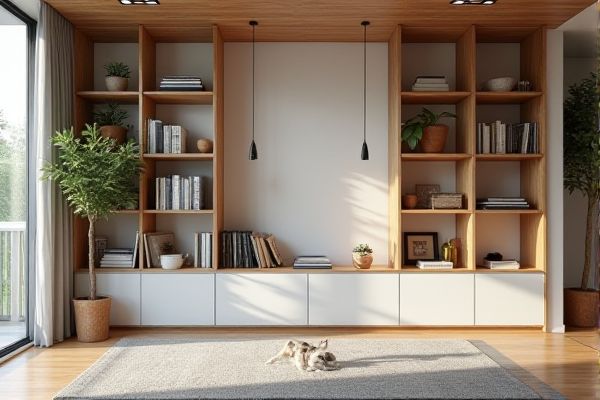
Modular shelving offers flexibility and easy customization for changing storage needs, while built-in shelving provides a seamless, permanent solution that maximizes space and adds value to your home. Discover which option best suits your lifestyle by reading the rest of the article.
Table of Comparison
| Feature | Modular Shelving | Built-In Shelving |
|---|---|---|
| Installation | Easy to install and relocate | Permanent, requires professional installation |
| Customization | Highly flexible, reconfigurable | Custom-designed for specific spaces |
| Cost | Generally more affordable upfront | Higher initial investment |
| Durability | Durable but may wear with frequent moves | Long-lasting, built for structural integration |
| Space Efficiency | Adjustable, fits varied spaces | Optimized for available area |
| Design | Modern, versatile styles | Seamless integration with interior decor |
| Resale Value | Minimal impact | Can increase home value |
Introduction to Shelving Solutions
Modular shelving offers flexibility with customizable configurations that adapt to changing storage needs, making it ideal for dynamic living spaces and offices. Built-in shelving provides a permanent, seamless integration into walls, enhancing aesthetic appeal and maximizing space efficiency in homes or commercial settings. Both solutions cater to different functional and design priorities, influencing the choice based on adaptability versus long-term structural enhancement.
Defining Modular and Built-In Shelving
Modular shelving consists of standalone units designed for easy assembly, customization, and mobility, making it ideal for flexible storage solutions. Built-in shelving is permanently integrated into a room's architecture, offering a seamless, tailored look that maximizes space efficiency. Choosing between modular and built-in shelving depends on factors like installation permanence, design preference, and adaptability needs.
Aesthetic Flexibility and Customization
Modular shelving offers unmatched aesthetic flexibility, allowing you to easily reconfigure, expand, or relocate units to suit changing decor and storage needs. Built-in shelving provides a seamless, integrated look that enhances room architecture but has limited customization once installed. Your choice depends on whether you prioritize adaptable design or a permanent, tailored fit to your space.
Space Optimization and Room Layout
Modular shelving offers versatile space optimization by adapting easily to changing room layouts, allowing for customizable configurations that maximize storage in irregular or limited spaces. Built-in shelving integrates seamlessly into walls, providing a permanent, streamlined solution that enhances room flow and maintains open floor plans without occupying extra square footage. Choosing between the two depends on whether flexibility or a cohesive, space-saving design is the priority for the room's functionality.
Installation Process and Complexity
Modular shelving offers a straightforward installation process with minimal tools and no structural modifications, making it ideal for renters and those seeking flexibility. Built-in shelving requires professional installation, involving wall reinforcement, precise measurements, and often electrical or plumbing considerations, resulting in a more complex and time-consuming setup. The complexity of built-in units provides a seamless, custom fit, while modular shelves prioritize ease of assembly and adaptability.
Cost Comparison: Modular vs Built-In
Modular shelving typically costs less upfront due to its flexible design and mass-produced components, making it a budget-friendly choice for your storage needs. Built-in shelving involves higher expenses because of custom craftsmanship, materials, and installation labor, which add long-term value through durability and seamless integration. Considering your space and budget, modular shelving offers affordability and ease of reconfiguration, while built-in shelving serves as a permanent, higher-investment solution.
Durability and Material Options
Modular shelving offers versatility with materials like metal, wood, and plastic, allowing easy customization and relocation, but may lack the long-term durability of built-in shelving, which is typically constructed from solid wood or high-quality plywood for enhanced strength and permanence. Built-in shelving is integrated into your walls, providing superior stability and often increasing property value, while modular units offer flexibility without the need for professional installation. Choosing between these options depends on your durability needs and preference for material variety versus structural robustness.
Adaptability to Changing Needs
Modular shelving offers superior adaptability to changing needs by allowing users to easily reconfigure, expand, or relocate shelves without major renovation. Built-in shelving provides a more permanent storage solution, often tailored to specific spaces but difficult to modify once installed. For dynamic environments or evolving storage demands, modular systems provide the flexibility necessary to accommodate growth or shifting organizational requirements.
Maintenance and Longevity
Modular shelving offers easy maintenance and the flexibility to replace or upgrade individual components, extending its useful life without major renovations. Built-in shelving often requires more upkeep due to its permanent installation, but provides enhanced durability and stability that can last for decades if properly maintained. Your choice should balance the ease of maintenance with the desired longevity based on your space and usage needs.
Choosing the Right Shelving for Your Space
Modular shelving offers flexibility and easy customization, making it ideal for dynamic spaces that require frequent reorganization or adaptability. Built-in shelving provides a seamless, permanent solution that maximizes space efficiency and enhances property value through a tailored fit. Selecting the right shelving depends on whether you prioritize versatility and mobility or a cohesive, integrated design that complements your room's architecture.
 homyna.com
homyna.com